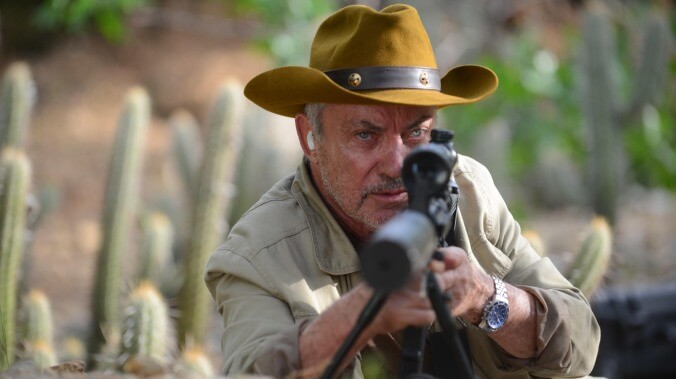If you think you know what Bacurau is all about, keep watching

The first half of Bacurau plays almost like a travel ad for a certain type of tourist. The remote village of the title, a close-knit but economically disadvantaged community deep in Brazil’s wild Northwestern region, is the type of socialist paradise that armchair revolutionaries like to wax misty-eyed about over cheap red wine. It’s a place where no one has much, but everyone shares what they have, and all contribute according to their abilities. All types of bodies and desires are celebrated without shame. The corrupt politician (Thardelly Lima) who cynically rolls into town bearing ripped-up books and expired food is met with jeers and curses. News is disseminated via walkie-talkies, and authority is split between a handful of elders—including the town’s lone doctor, Domingas (Sônia Braga), who also keeps loving watch over Bacurau’s small but thriving sex trade. Beginning with a life-affirming farewell for another elder and proceeding at the unhurried pace of life in the sunbaked sticks, it’s a charming, laid-back ensemble drama documenting an endangered way of life—until it becomes something else entirely.
In this same communal spirit, Juliano Dornelles—who worked as a production designer on Kleber Mendonça Filho’s films Aquarius and Neighboring Sounds—is promoted to co-director alongside his collaborator for Bacurau. And although the first sign that the film will go in some very strange directions indeed comes when Bacurau disappears from Google Maps mid-geography lesson, the film’s own internal sense of geography is clear and strong, at least within Bacurau itself. But although it’s small enough to be laid out on a paper map in just a few rows of modest houses, the village has its secrets—as does the film, which parcels out dystopian sci-fi story details bit by batshit bit before blossoming into an action bloodbath in its last 30 minutes. In a film that runs just over two hours, this approach may alienate viewers looking for a more straightforward genre experience. But the revolutionary catharsis of the film’s climactic showdown is righteously inspired, even if the bus does break down a few times along the way.
Bacurau’s radical shift into genre is marked by the arrival of B-movie icon Udo Kier halfway through the film, improbably but humorously cast as an American businessman leading a clique of heavily armed tourists. It’s easy to imagine the same wannabe warriors who insist on carrying assault rifles to Target buying in to Michael’s (Kier) sales pitch of a package tour to Brazil to hunt the most dangerous game, guilt-free—bottled water and air-conditioned transport back to basecamp after living their war-crime fantasies included. As one tells the group in an unnervingly chipper tone as they march through the brush, “God’s given [him] the opportunity” to take out his homicidal hatred of his ex-wife on some people who, in his mind, don’t matter. As a statement on American entitlement and the intersection between capitalism and colonial terror, it’s a frying pan to the back of the skull: clunky but powerful.
That clunkiness is what marks Bacurau as an unforgettable oddity rather than a great genre film in its own right: The anger and energy behind the film are focused, but the tone is not. There are a lot of ideas packed into this movie, as well as a lot of characters, a lot of musical cues, and a lot of winking, Star Wars-style wipe transitions. And Dornelles and Filho keep pausing to chase cinematic butterflies, like an extended scene where children test each others’ bravery that we know is building to some sort of shocking climax, but is in no rush to get there. While the story is genuinely surprising and unique once it gets where it’s going, the diversions along the way make Bacurau more intellectually exciting than viscerally tense, even in that gory back half. Still, there’s a lot to be said for the film’s sense of mischief, a quality that’s as innate to Bacurau as the rest of life’s simple pleasures.